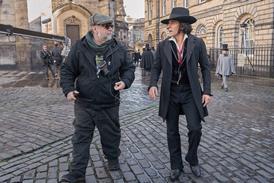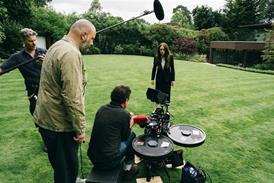STEVEN KNIGHT
The writer of David Cronenberg's Eastern Promises tells Edward Lawrenson about a 'painless' experience working with the Canadian master
After 2002's Dirty Pretty Things, which explored the twilight existence of London's illegal immigrants, and Eastern Promises, which portrays the Russian gangster underworld in the city, Steven Knight is well known for dark studies of the hidden side of London life.
But this reputation for modern-day noir belies early experience writing in television light entertainment, notably for British comedian Jasper Carrott and on Who Wants To Be A Millionaire. "A background in TV is good because it teaches you respect for deadlines," says Knight, who picked up an Oscar nomination for Dirty Pretty Things. "Also when you're writing comedy the dialogue has to be dead right."
His screenplay for Eastern Promises was picked up by David Cronenberg as his next project after A History Of Violence but the film originally started out as a TV drama. "About five years ago it was going to be two one-hour episodes for BBC1," Knight says. "But when the script was written it reached BBC Films and they suggested it as a feature."
Knight describes his collaboration with Cronenberg as "quite painless". "He liked the script when he found it. He had some comments and would identify the problems but he'd let you solve them rather than offering solutions himself. In terms of actual meetings, we had a three-day meeting booked in Toronto to discuss the script about three or four months before shooting and it took two hours.
"Talking to other writers I realise I've been lucky," Knight says of working with other directors. "It's never been a case of endlessly going through stuff, which I think is totally counter-productive."
TABU
The star of Mira Nair's The Namesake drew on her family experience to play a Bengali woman who moves to New York. Patrick Z McGavin reports
In her adaptation of Jhumpa Lahiri's novel The Namesake, film-maker Mira Nair needed a chameleon for the critical part of Ashima, a Bengali woman we see pass from an exquisitely beautiful 19-year-old girl to a middle-aged woman.
The gifted Indian actress Tabu makes her impressive US debut in the film. Born Tabassum Fatima Hashmi, the 36-year-old niece of actress Shabana Azmi made her first film at 15 and has twice won India's most distinguished acting prize, the National Film Award.
The Namesake, which shot in India, the US and Australia, felt to Tabu like an Indian production. "I played this sort of character twice before, somebody you see from 19 to their mid-40s," she says.
Both the novel and film examine the cultural divide of identity, East and West and the inevitable tensions created by the clash of tradition and modernity. Tabu had her own family's experiences to draw on. "I have two of my sisters and my cousins who moved to the US. I have seen the whole journey."
Tabu has an eclectic background in Bollywood, working in musicals, comedies and stylised melodramas. "Everything prepares you for the next thing," she says. "Whatever I am doing today is the sum total of what we've learned in the past. I've worked with so many directors and actors and I've learned and grown along the way."
TONY GILROY
The director of Michael Clayton tells Patrick Z McGavin why it's OK to be confused
Tony Gilroy's Michael Clayton opens on a black frame and a staccato burst of dialogue from a disembodied voice. The character's identity remains teasingly unknown. "The openings of movies are so critical," Gilroy says. "You establish your terrain. I want to make a little announcement, and you're going to have to lean forward and pay attention. I also want to let people off the hook and (let them) know not everything here is absolutely critical and you can be confused."
The moment makes the viewer instantly aware that language is just as important as the movie's imagery and demonstrates how speech establishes character, situation and drama. Gilroy is the principal writer on the Bourne franchise. In the Bourne films, action establishes character: in Michael Clayton the dynamics are reversed.
The $22m film was backed by Warner Bros and stars George Clooney in the eponymous lead role as a fixer at a prominent Manhattan law firm. The film's volatile mixture of pathos and corporate sleaze dovetails with some of Gilroy's favourite writers, including James Farrell and Robert Stone and the playwrights David Mamet and Harold Pinter.
Before beginning a first draft of a script, Gilroy assembles a vast accumulation of sketches, dialogue and scenarios that produce a story outline. Michael Clayton is his first film as a director, a job he was ready to perform. "Every film I've ever written I've directed in my mind," he says.

















No comments yet